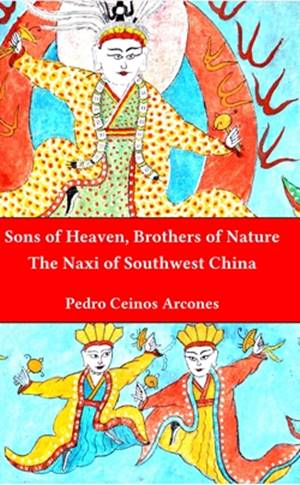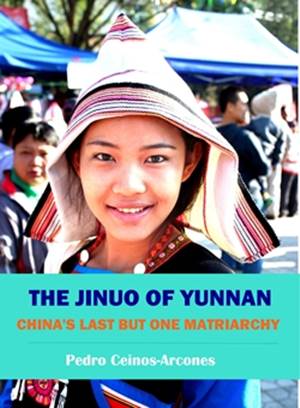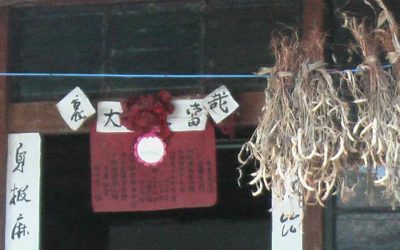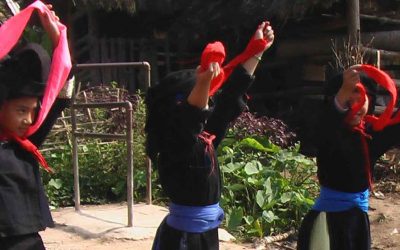To have five sons, rich, vigorous, literate and who become mandarins: this is the ideal of any Chinese family. From this matrix idea emerged the various types of popular images that are displayed in all households: Wu Zi Deng Ke (五子登科), Have five official children! And Baizitu (百子图), table of one hundred children (from King Wen).
1° To obtain the fulfillment of this dear desire, the spouses have recourse to the most obliging deities:
- a) Guanyin pusa (观音菩萨), the «most merciful», the one who gives children (Guanyin songzi). In various areas of Jiangnan, women offer the goddess a pair of beautifully embroidered shoes in order to get her help and obtain the birth of a child. Other times, one of the shoes placed at the foot of her statue is removed, then, after the birth of the child, is replaced by a pair of artistically embroidered shoes.
- b) The daughter of the god of Taishan, the famous Bixia Yuanjun (碧霞元君), also called The Celestial Lady Delivering Sons (Tianxian songzi), The Lady of Taishan (Taishan niangniang), or the Lady of Jade Delivering Sons (Yunü songzi). Her images, very varied in form, are very common and there are myriads all over China.
The goddess’s assistants are usually:
The Posterity Matron Zisun niangniang (子孙娘娘)
The Fertility Matron. Zhusheng niangniang (注生娘娘)
The Midwife who triggers the birth. Cuisheng niangniang (崔生娘娘)
The Matron who brings the child. Songsheng niangniang (送生娘娘)
- c) The immortal Zhang Guolao, riding on his donkey and carrying a child in his arms.
Kuixing, the god of literature, who is prayed for intelligent children in letters.
Lu Dongpin, the immortal of letters.
- d) The genius Zhang Xian, the protector, armed with a bow and firing an arrow at the Celestial Dog, the great enemy of childhood. His son Jiantan is in charge of delivering children to those who beg him.
- e) An-kong, very honest in Anhui, near Wuhou; he is also invoked to obtain offspring.
- f) Many pagans make pilgrimages to renowned pagodas, where the famous Buddhas are honored. For example, in Emeishan, Sichuan province; Wutaishan, Shanxi province; Jiuhua shan, Anhui province; Langshan, Jiangsu province.
In this last place, a wheel, finished in a small pagoda, is set in motion by those who wish to obtain an heir. It is a source of income for the monks.
- g) Qilin Songzi. The unicorn that provides children. The paintings depict this fabulous animal, mounted by a young woman with a child in her arms. For this reason, the unicorn appears on top of the bride’s red chair.
2° The images of good luck, or of good omens, are unlimited in number; they express a desire rather than a true prayer.
For example. Four children: one wears a branch of jujube (zao) covered with fruit, the second a sheng musical instrument, the third has a seal, emblem of the dignity of the mandarins, the fourth holds a halberd and the insignia of a military mandarin. The allusion of the image is:
To generate (sheng) quickly (zao) children of high dignity.
The word game works on both sounds: zao 枣, jujube, sounds just like zao 早, soon; and sheng 笙, musical instrument, just like sheng 生, generate. It’s just a wish expressed to the bride, often without a superstitious idea.
3° Means of procreating a male child.
(a) Zaonan. A household that has the misfortune of not having a son, but only girls, performs the following action. The first girl to be born will be named after a boy: and the charm will be broken; the boy born after her will surely be a boy. It’s called fathering a child.
(b) Another less harmless procedure is to frighten the soul of the child who dares to incarnate in the womb of the mother. For that purpose the young wife carries a silver knife in her chest. This knife is also used as protection against harmful influences and against evil goblins.
(c) Other superstitions are practiced to recognize the sex of the child before birth. Diviners, character casters and seers are frequently consulted.
This practice is not new! In 680 B.C., the hegemon Qi Huangong consulted the turtle and drew lots to find out the sex of a child to be born to him.
4° Influence of the spirits of the bed, male and female. Chuang-gong 床公and Chuangmu 床母. The image of these spirits is stuck on the bed or in its vicinity; they preside over the conception of the children.
5° Talismans. Taoist monks and teachers draw talismans to speed up childbirth. They are grimoire traced on strips of yellow paper; in the paper horse shops [so called because in many ceremonies papers are burned where a horse is drawn, which will carry the petition to the gods] they sell them to the pagans for this use. Sometimes they are applied to the pregnant woman’s body, other times they are burned and the ash mixed with a potion is swallowed.
6° The Mirror.
A pregnant woman should avoid any sinister encounter; for example: funerals, visits to the sick.
It is prudent to provide her with a small mirror suspended on her chest to ward off evil spirits that may harm the child.
7° Silkworm breeders fear the entry of a pregnant woman into the room where the worms feed.
8° Boy dressed as a girl.
After the death of one or more children at an early age, parents put into practice a remedy to preserve the life of the next born: they dress him in a girl’s disguise, to deceive demons.
Girl’s name.
For the same reason, the newborn will be given the name of a small nun. In this way they will keep an heir of the family, a son destined to offer sacrifices to his deceased parents: two things of first importance.
9° The figurines.
Some pagodas display children’s figurines. The women go there to choose one of their choice, they pass a necklace of sapecas around its neck, the monk gives it a name, and the woman takes it with the assurance that she will soon have a child.
10° Exposure of the tablet of the midwife who activates the childbirth.
At home, at the time of delivery, the tablet of the midwife who triggers the delivery is exposed. Several goddesses perform this service, including Kekou niangniang, in the Huzhou district of Anhui.
11° To make a vow before a tutelary divinity.
To obtain a male child, a vow will be made to a divinity, promising to deliver the newborn as a monk to his service, and after birth he will indeed be clothed as a monk as a token of gratitude. In this case, the parents will be obliged to rescue him through alms, either in money or in kind. The ransom price is paid to the pagoda.
12° To offer a brick.
A brick is taken from a bridge called «Guanyin Bridge» or «Unicorn Bridge» and taken to the children’s room. It is a play of words between 砖 zhuan, brick and 转 zhuan, transmit, offspring. At the same time, it is an allusion to Guanyin, the godess who gives children and Qilin Songzi, the unicorn who gives children.
This is one of the most curious customs for wishing a family the birth of a male heir. Its name is:
13° To offer a melon.
This offering is made on the 15th day of the eighth lunar month. The melon must be skillfully stolen from a particular garden, and the thief must not be seen, otherwise the charm would lose all its effectiveness.
The melon, carefully boiled, is dressed like a baby, the figure of a child is drawn on the bark, and then taken to the sound of music and firecrackers to the person to whom one wants to give it, as a gift of a child. The melon is placed on the bed, covered with a quilt, and the distinguished old man who must place it there says:
«Whoever plants melons harvests melons, whoever plants peas harvests peas. ”
A good dinner is served to the porters. The young woman who wishes to become pregnant must eat the melon, and she will surely bring a beautiful child into the world.
14° Similarly, on the 15th of the 8th lunar month, women do not empty their night bedpans, commonly called zitong in the field. Neighbors wouldn’t stop stealing the lid or the pot itself to have a child. It is known that women, after cleaning this vase, leave it outdoors and place the lid so that the air and wind dissipate the bad smell. Why this fear? A simple play on words. The zi character 子, child, is the same zi in zitong.
From: Henry Doré. Manual of the Chinese Superstitions.
More posts on Chinese culture
Basic Geography of China
Basic Geography of China The People's Republic of China, with an area of more than 9,600,000 km2 is the third largest country on our planet, after Russia and Canada. The name China derives from the name given to it by its neighbors, because the Chinese call their own...
The religions of China
The religions of China Every people has the religion they inherit from their ancestors. This widely spread aphorism is truer in China than in other countries. Scholars say that the primitive religion of the Chinese, as of the peoples who lived near them, was the cult...
Notes on the Chinese theater
Notes on the Chinese theater The Chinese were extremely fond of theatrical performances. According to their traditions these originated in the time of Emperor Ming Huang of the Tang dynasty, later revered as the patron saint of actors, without whose help it is...
Taoist ceremony of repaying the debt
Taoist ceremony of repaying the debt Last week (on the 17th day of the fourth lunar month, 2018) took place at Zhenqing Temple (真庆观), the largest Taoist temple in Kunming and the best-preserved so far, the ceremony called "Repaying the Debt of Life". That ceremony is...
Classics of Filial Piety
Classics of Filial Piety Since the establishment of a Confucian society in the Han dynasty, some two thousand years ago, filial piety could be considered the central pillar around which Chinese society has been built. The behavior of each person towards his father...
Teahouse: A Drama by Lao She
In Brief: One of the best contemporary plays compels multiple reflections on hope and power, and perhaps that universal dream of living in a just society. A drama that unfolds in a limited space spanning half a century of Chinese history. In the three acts in which it...
More posts on China ethnic groups
Zhuang Folk Tales from Wuming
Zhuang Folk Tales from Wuming This book is a good sample of the folk literature of the Zhuang people living around Wuming County. Though formally separated in six chapters under the epigraphs of Traditional virtues, Bravery and Diligence, Cleverness and Creativity,...
Researches on the Mo culture of the Zhuang
Researches on the Mo culture of the Zhuang (壮族墨文化研究 Zhuang zu mo wenhua yanjiu). Huang Guiqiu。 Nationalities Press. Beijing. 2006. 321 pp Mo culture of the Zhuang refers to the Mo beliefs of the Zhuang and the Buyi nationalities; as their culture share a high...
Deciphering the culture of the fertility cults
Deciphering the culture of the fertility cults (生殖崇拜的文化解读 Shengzhi chongbai de wenhua jiedu). Liao Mingjun. Guangxi Peoples Press. Nanning, 2006 This book is a study of the fertility cults among the Chinese nationalities. Introducing the reader the different...
Pregnancy and Birth ceremonies among the Sha branch of the Zhuang
Pregnancy and Birth ceremonies among the Sha branch of the Zhuang The Sha are one of the branches of the Zhuang. They live in Yunnan province. The birth of a new child among them is surrounded by rituals that present significant differences from those of other...
Some dances of the Zhuang people
Some dances of the Zhuang people The Zhuang have a number of dances. Originating from different periods of their history, it is thought that the older ones have a ritual origin, imitating the movements of their shamans during their religious ceremonies. In general...
Festivals of the Zhuang Nationality
Festivals of the Zhuang Nationality New Year The most important festival of the Zhuang year. Their celebration is similar to that of the local Chinese, although with some special characteristics. The children play their traditional games. In Wenshan County horse...















